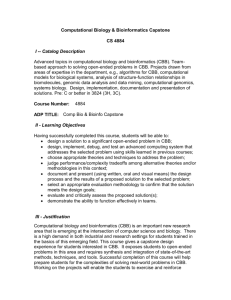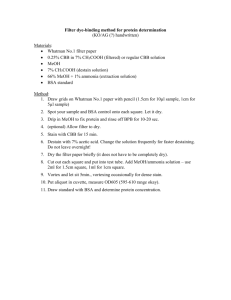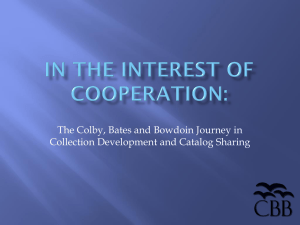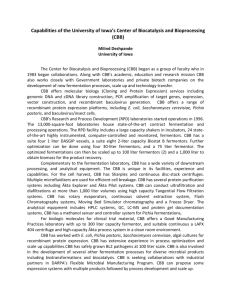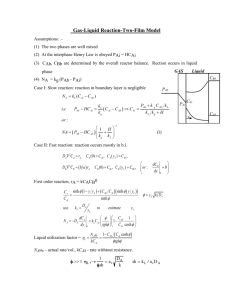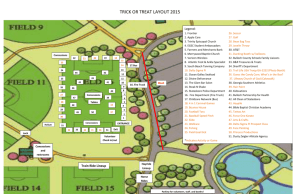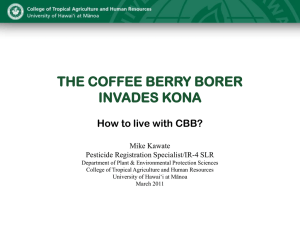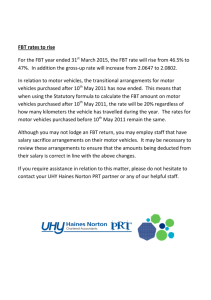Submission responding to the NFP Sector Tax Concession
advertisement
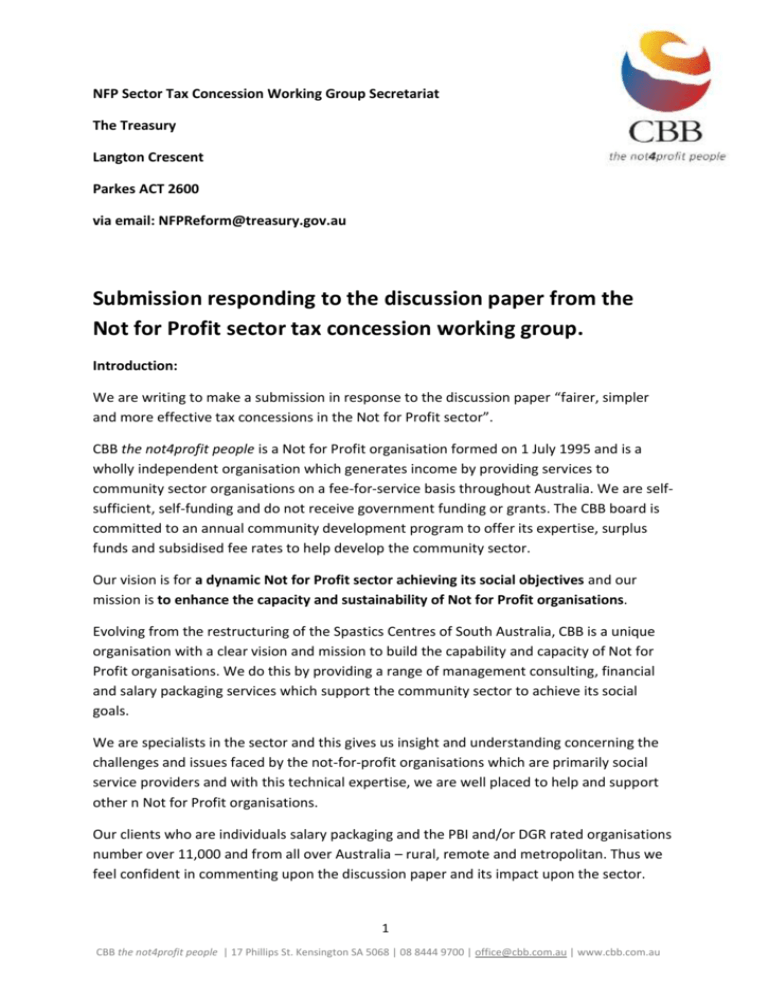
NFP Sector Tax Concession Working Group Secretariat The Treasury Langton Crescent Parkes ACT 2600 via email: NFPReform@treasury.gov.au Submission responding to the discussion paper from the Not for Profit sector tax concession working group. Introduction: We are writing to make a submission in response to the discussion paper “fairer, simpler and more effective tax concessions in the Not for Profit sector”. CBB the not4profit people is a Not for Profit organisation formed on 1 July 1995 and is a wholly independent organisation which generates income by providing services to community sector organisations on a fee-for-service basis throughout Australia. We are selfsufficient, self-funding and do not receive government funding or grants. The CBB board is committed to an annual community development program to offer its expertise, surplus funds and subsidised fee rates to help develop the community sector. Our vision is for a dynamic Not for Profit sector achieving its social objectives and our mission is to enhance the capacity and sustainability of Not for Profit organisations. Evolving from the restructuring of the Spastics Centres of South Australia, CBB is a unique organisation with a clear vision and mission to build the capability and capacity of Not for Profit organisations. We do this by providing a range of management consulting, financial and salary packaging services which support the community sector to achieve its social goals. We are specialists in the sector and this gives us insight and understanding concerning the challenges and issues faced by the not-for-profit organisations which are primarily social service providers and with this technical expertise, we are well placed to help and support other n Not for Profit organisations. Our clients who are individuals salary packaging and the PBI and/or DGR rated organisations number over 11,000 and from all over Australia – rural, remote and metropolitan. Thus we feel confident in commenting upon the discussion paper and its impact upon the sector. 1 CBB the not4profit people | 17 Phillips St. Kensington SA 5068 | 08 8444 9700 | office@cbb.com.au | www.cbb.com.au CBB is a member of both ACOSS and SACOSS and aware of their submissions to the working group. It is not our intention to duplicate their commentary as we are in support of the content their submissions. We shall comment selectively and independently on some of the questions raised in the working paper. General comments: There are inequities in the tax concession system and it is appropriate to be reviewing the scope as identified. It is however unfortunate that the timing of this review is concurrent with so many other major reforms and challenges to the stability and workload of the sector in the context of other major reform agendas – ie ACNC; introduction of the modern award; NDIS; the national pay equity case for the sector; national standard chart of accounts; workplace health and safety harmonisation; review of fund-raising regulation; and the review of companies limited by guarantee. These reforms are creating a considerable amount of worry and work for the sector which is already grossly overworked and under resourced. The potential changes arising from the directions postulated in the discussion paper could be major and need a longer time frame than has been given in which to consider the proposals and issues which are flagged in the paper. There is simply not enough time to do the seriousness of these issues justice - a longer period of time is really needed for boards and management to give consideration to the depths of the issues and consult key stakeholders of their organisations. Almost all of the issues arising and strategies forthcoming from the consideration of options are significantly dependent upon the yet to be determined definition of “charity”. It is particularly difficult to make suggestions and consider alternatives which are proposed in the paper without knowing which organisations with which characteristics will fall within the new definition of charity. It would seem far more practical and sensible to resolve the definition prior to decision making with regard to the majority of the issues discussed in the paper. We feel that it will be much more productive and will enable more positive contribution from community services if decision-making is delayed and further consultation is undertaken once the definition of charity is resolved and publicized. Without such consultation and delayed timeframe we feel that the sector will in general remain somewhat cynical and suspicious about the intentions of government. We support absolutely the guiding principles seeking to be achieved by the review. We believe there are a number of opportunities to improve existing systems and existing policies with good effect without having to undertake major and disruptive change to an already change-weary sector. 2 CBB the not4profit people | 17 Phillips St. Kensington SA 5068 | 08 8444 9700 | office@cbb.com.au | www.cbb.com.au Eligibility We support the need for uniform national criteria to be used to determine the exemption eligibility. There appears no good argument to extend the existing or type of NFP's that are eligible for exemption -- the key criteria is that the NFP should be focused on social purpose and any funds generated are directed towards the achievement of the objectives of the Constitution of the organisation in terms of meeting its social objectives. This would therefore leave current PBI's and rebateable entities as the eligible organisations. Franking credits Access to franking credits should remain possible for the full range of eligible benefits for the purpose NFP's - franking credits enable a wide range of organisations to be able to maximise their use of funds and some limited opportunity to make some return from funds held in reserve for new programs and development towards achieving greater outcomes with regard to their social objectives. Some grant giving organisations for example could lose potentially hundreds of thousands of dollars which would not therefore be available for programs. Similarly a restriction to eligibility for franking credits may well impact negatively on the size of philanthropic or private donations. ATO endorsement framework We see no benefit or argument to extend the endorsement to a wider range of NFP's beyond those defined as charities. This would reduce taxation income and therefore may create pressure upon the potential argument to reduce ATO endorsement of existing charities. It is genuine charities that need the support. Taxation generally is complicated in Australia and presumably could be much simpler along the lines of a jurisdiction like Hong Kong where there is a much simpler and therefore less bureaucratic and costly process in place. CBB would welcome general simplification and consistency to reduce costs which again presumably could be returned to support the good work done by the not-for-profit sector. Income tax exemptions We support the notion of increasing the tax free threshold for taxable NFP clubs associations and societies basically because it would appear to be likely to reduce the compliance burden on those entities and therefore a less costly and simpler system. 3 CBB the not4profit people | 17 Phillips St. Kensington SA 5068 | 08 8444 9700 | office@cbb.com.au | www.cbb.com.au DGR Extending DGR status to those identified as possibilities in the paper is not supported. DGR should be automatically provided to PBI organisations because this seems logical and negates the need for a separate argument and approval process -- which again is unnecessary and therefore costly to administer. Tax incentives for donors We accept the notion of implementing tax offset mechanism to improve the fairness of the system as all taxpayers would receive a similar tax benefit stop we also agreed that this would be a more transparent and efficient process. We do not accept the proposal to encourage the tax incentive for testamentary giving mainly due to the argument in the paper that the effectiveness of this option is likely to be low. It may well increase costs, bureaucracy and inconsistency. Creating a clearinghouse for donations DGR's This is a totally unacceptable proposal given that it removes any personalisation of donations. The bureaucratic centralisation costs which would be incurred are significant and without justification. Donors are used to monitoring recording and claiming their donations currently and there is no argument to change this. Public fund requirements for charities registered by the ACNC We have no objection to eliminating public fund requirements for charities registered by the ACNC or for simplification of property donation rules and anti-avoidance rules. These are seen as sensible reforms which may have positive outcomes for donations entering the sector. Increase the threshold for a deductible gift We support the notion of increasing the threshold from two dollars to a significantly higher figure -- however we believe that something of the order of $10 would be more appropriate and could be the subject to broad cost of living increases every 3 to 5 years. 4 CBB the not4profit people | 17 Phillips St. Kensington SA 5068 | 08 8444 9700 | office@cbb.com.au | www.cbb.com.au Fringe benefits tax concessions Specific consultation questions are addressed in this section because we believe we have high credibility and experience regarding the FBT and salary packaging issues. (It should be noted that we have referred to and concurred with much of the Cancer Council of Australia's submission on the discussion paper in this section). 1. Assuming that the current two-tiered concessions structure remains (see Part B), what criteria should determine an entity’s eligibility to provide exempt benefits to its employees? The entity should be a PBI, which has obtained an income tax and DGR status with the ATO/ACNC. The charity should have clear constitutional objectives that benefit the community. Any worker employed by the charitable entity or any of its subsidiaries should be eligible to access exempt benefits. Should the list of entities eligible for exemption or rebate be revised We are gravely concerned about the ability of some government and health facilities to be able to gain fringe benefits tax concessions. FBT concessions were and still are designed to provide some staff attraction and retention ability to compete at least partly with government and private sector employers who are unable to offer considerably higher remuneration packages and salaries. The existing exemptions still do not go far enough in making up the difference between salaries of these sectors and the not-for-profit sector, however they do make up some of the difference and give the not-for-profit sector some chance of attracting committed, social and values driven employees who are willing to work in this sector for less money and personal reward. It seems contradictory to this principle for hospitals health services and government quangos such as a legal aid agency to be able to offer high government salaries and then claim salary packaging up to the $16,000 or $30,000 grossed up amounts. Doctors should not be able to earn 6 figure salaries, have private practice rights, and be able to salary package with meal and holiday accommodation on top of that. This eventuality was never the intention of the exemption legislation. We know of NFPs who are effectively the training ground for inexperienced employees in such fields as social work and counselling who then gain some experience and knowledge in the not for profit sector and graduate into similar positions in government to obtain much higher salaries -- these people are lost to the sector which went to the expense of recruiting and training them for government. This is unacceptable. Only charities and their staff should the eligible for FBT exemption. 5 CBB the not4profit people | 17 Phillips St. Kensington SA 5068 | 08 8444 9700 | office@cbb.com.au | www.cbb.com.au 2. Also assuming that the current two-tiered concessions structure remains (see Part B), what criteria should determine an entity’s eligibility to provide rebateable benefits to its employees? Should this be restricted to charities? Should it be extended to all NFP entities? Are there any entities currently entitled to the concessions that should not be eligible? Eligible PBI charities should enjoy the full $30k grossed up taxable value, as this opportunity is highly beneficial in the recruitment of staff who would not normally be attracted to the lower base salary being offered. Inflation since the introduction of the limits has eroded the value to employees. 3. Should there be a two-tiered approach in relation to eligibility? For example, should all tax exempt entities be eligible for the rebate, but a more limited group be eligible for the exemption? The current two-tiered approach should be continued with tight definitions of charitable purpose. 4. Should salary sacrificed meal entertainment and entertainment facility leasing benefits be brought within the existing caps on FBT concessions? 5. Should the caps for FBT concessions be increased if meal entertainment and entertainment facility leasing benefits are brought within the caps? Should there be a separate cap for meal entertainment and entertainment facility leasing benefits? If so, what would be an appropriate amount for such a cap? 6. Are there any types of meal entertainment or entertainment facility leasing benefits that should remain exempt/rebateable if these items are otherwise subject to the relevant caps? Even though CBB is a salary packaging provider, albeit the only Not for Profit salary packaging provider and returning funds to the Not for Profit sector, we accept the concerns about the uncapped meal entertainment and entertainment facility leasing concessions. We do not think that they should be disallowed but rather available in one of two ways, both of which would be subject to cost of living increases periodically (as should the Salary Packaging cap): - being included in the total cap which would be increased to allow for this increase, or - being included as an additional option as it is now above the cap but with its own cap There are other options to maintain but improve the system for these benefits, however they would be more complicated to administer, more confusing and potentially subject to misuse and thus not recommended. 6 CBB the not4profit people | 17 Phillips St. Kensington SA 5068 | 08 8444 9700 | office@cbb.com.au | www.cbb.com.au 7. Should there be a requirement on eligible employers to deny FBT concessions to employees that have claimed a concession from another employer? Would this impose an unacceptable compliance burden on those employers? Are there other ways of restricting access to multiple caps? Require employment declarations to include information about FBT concessions to avoid employees from benefiting from multiple caps. The issue of multiple jobs is a complex one which on face value appears to be over the top. However we have many individuals working in the sector and salary packaging with CBB who are lowly paid and have two or three jobs with few hours with each employer - these people are typical of the ones for whom the exemption was clearly designed to assist and encourage to find employment rather than be a cost to the government by seeking unemployment benefits. These people should be allowed to continue to be able to have a number of jobs with different employers and therefore able to maximize their concession earnings. Alternatively there are some individuals who may be using this to take advantage beyond the intention of the act. A simple way to improve this system would be to cap the income from multiple jobs which is able to be salary packaged in a similar way to persons working with multiple employers reaching the tax threshold cumulatively. 8. Should the rate for FBT rebates be re-aligned with the FBT tax rate? Is there any reason for not aligning the rates? Yes, the FBT rebate should be re-aligned with the top marginal tax rate. Any variation to this would further complicate transaction calculations, and be inconsistent with the general FBT legislation. 9. Should the limitation on tax exempt bodies in the minor benefits exemption be removed? Is there any reason why the limitation should not be removed? The current limitation should be removed. The NFP sector should be entitled to the same administrative concessions as are general employers and also be able to apply the minor benefits and in-house entertainment rules. 10. Is the provision of FBT concessions to current eligible entities appropriate? Should the concessions be available to more NFP entities? The current $30k grossed-up limit should be raised and then adjusted periodically for cost of living increases, without extension to a wider group of eligible entities. Extension would be costly and inconsistent with the support being offered to genuine ‘for purpose’ charities (PBIs). 7 CBB the not4profit people | 17 Phillips St. Kensington SA 5068 | 08 8444 9700 | office@cbb.com.au | www.cbb.com.au 11. Should FBT concessions (that is, the exemption and rebate) be phased out? No. It would be very difficult for charities to recruit and retain quality staff while offering a remuneration package significantly lower than commercial market rates. FBT concessions improve the take-home benefits, thus minimising the total cost to the charity. 12. Should FBT concessions be replaced with direct support for entities that benefit from the application of these concessions? No. The replacement system of applying for government grants would be quite onerous, costly and ineffective. The compliance and reporting costs, as with current grants, would be prohibitively high. Many charities are already under-resourced to apply for grants and they are subject to skills and time needed to prepare submissions and applications. It would not help to expect charities to do more of the same work which is already difficult and somewhat unfair in terms of outcomes. A new system of funding would be vulnerable to reduction over time without transparency just for the Government to save money and gradually reduce funding to the sector and its programs. The current system has its weaknesses and inconsistencies however it is understood. Any new system would be a great burden given the amount of change already being undertaken in the sector and quite counterproductive. 13. Should FBT concessions be replaced with tax based support for entities that are eligible for example, by refundable tax offsets to employers; a direct tax offset to the employees or a tax free allowance for employees? A direct tax offset or allowance would be difficult to administer, enormously confusing and potentially inconsistent. 14. Should FBT concessions be limited to non-remuneration benefits? If FBT concessions are to be phased out or if concessions were to be limited to nonremuneration benefits, which entity types should be eligible to receive support to replace these concessions? They should not be replaced and only registered PBI/ DGRs should be eligible to receive the support. Benefits that are incidental to employment should not be limited. The tracking of these benefits would be costly in relation to compliance. Moreover, FBT concessions should not be limited to non-remuneration benefits, because such concessions are important for attracting qualified people to the sector. 8 CBB the not4profit people | 17 Phillips St. Kensington SA 5068 | 08 8444 9700 | office@cbb.com.au | www.cbb.com.au GST GST is complicated and has been fraught with difficulty and inconsistencies since its inception when it was introduced in part to reduce non-transparent contracts and purchases. It is a nuisance and a pointless accounting process whereby the organisation becomes a tax collector with no gain to itself and only time consuming and therefore costly paperwork which is undertaken by the entity. It would be of significant benefit to find a simpler system which was not such an administrative burden upon the entity. Mutuality clubs and societies CBB shares SACOSS’s concern for the impacts of problem gambling and we reiterate and support the SACOSS submission on this topic. Our clients and networks are within the social service subset of the NFP sector so we feel less equipped to comment on this section, however we agree with SACOSS: It does not matter whether the gaming machines are owned privately or by a club, the impact is the same. We question why such a dubious revenue stream (noting that an estimated 40% of gaming machine revenue comes from problem gamblers) would attract tax concessions, particularly when some of the clubs function as large self-perpetuating corporations. We also note that many small community clubs also rely on gaming machine revenue. We support clubs over a reasonably high threshold being taxed on gaming machine revenue in the same way a commercial operator would be taxed, with deductions being possible for any money donated to charitable groups. Conclusion Thank you for the opportunity to respond to the discussion paper and we look forward to further rounds of consultation well before decisions are made and finalised. We reiterate our opening remarks by expressing our view that much more consultation is needed and over a longer time frame if there is to be any chance that the sector will engage in a positive manner around reform. The definition of Charity needs to be resolved and proposals viewed in the context of this definition. 9 CBB the not4profit people | 17 Phillips St. Kensington SA 5068 | 08 8444 9700 | office@cbb.com.au | www.cbb.com.au
